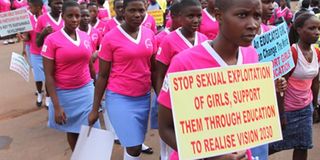Use data to make policies that address girl-child livelihood

Girls march to mark the International Day of the Girl Child in Kampala in October last year. File photo
What you need to know:
- We cannot improve what we can’t measure.
- For us to end the abuse and inequality girls are grappling with, we have to have data on realities of their lives.
- It is easier to ignore a problem when there is little evidence of how pervasive it is or how deeply it affects people.
Today we commemorate the International Day of the Girl Child under the theme: Girls’ Progress = Goals’ Progress: A Global Girl Data Movement.
The International Day of the Girl Child is commemorated every year on October 11. It is an opportunity to make the invisible lives of girls both their plight and their power truly visible, to inspire commitments and action to promote girls rights.
This year, the International Day of the Girl Child comes at the backdrop of the newly adopted Sustainable Development Goals that world leaders in 2015 committed to achieving by the year 2030. Specific among these goals is gender equality and the empowerment of all girls and women which like others has specific key targets.
The implementation towards achieving the sustainable goals is well underway. Indicators have been developed and rolled out to track progress at global, regional and national levels. However, there is a critical unfinished agenda on ensuring availability and use of high-quality, timely and reliable data on girls’ progress, including for those living in poverty or with disability.
Millions of girls are vulnerable because there is no accurate data on the magnitude of their rights violations and underlying causes. Lack of adequate data means governments are blind to the extent to which girls are denied their rights such as right to education or control over their bodies.
In Uganda, even with scattered information, we know that girls face deep-rooted inequalities and violations of their rights on a daily basis including, discrimination, harmful cultural practices such as child marriage, defilement, teenage pregnancy, school dropout, sexual assault, child poverty and poor health. We don’t know how many girls feel unsafe on their way to school or those that are absent from school because of menstrual challenges. Girls become effectively invisible as a result of these factors and are pushed to the margins of society.
We cannot improve what we can’t measure. For us to end the abuse and inequality girls are grappling with, we have to have data on realities of their lives. It is easier to ignore a problem when there is little evidence of how pervasive it is or how deeply it affects people. Government and all stakeholders must start recording girls’ circumstances if we are to meet the ambitious agenda set for 2030.
This year’s theme for International Day of the Girl Child presents government and all other stakeholders with an opportunity to appreciate that existing gaps in data on girls and young women, lack of systematic analysis, and limited use of existing data significantly limits our ability to monitor and communicate the wellbeing and progress of girls.
Only through explicit focus on collecting and analysing girl-focused, relevant and sex-disaggregated data, and using this data to inform key policy and programme decisions, can we adequately measure and understand the opportunities and challenges girls face.
Having girls’ issues counted calls for a deliberate and collective effort to increase resources to close the data gap. We must ensure that every girl counts and is counted.
There is proven evidence that girls when supported can be a force behind development. Investing in girls’ health, safety, education and rights in times of peace and crisis empowers them to reach their dreams and build better lives for themselves and their communities.
A recent study done by Plan International; Counting the invisible notes that the use of focused and relevant data in tackling girls’ issues will ultimately create an enabling environment for them everywhere to learn, lead, decide and thrive.
Ms Nakiwala is the communications manager at Plan International Uganda.
[email protected]




